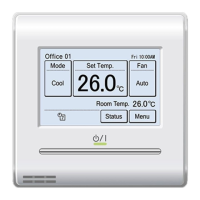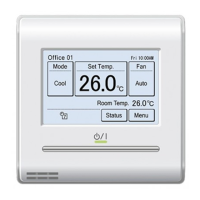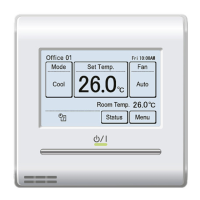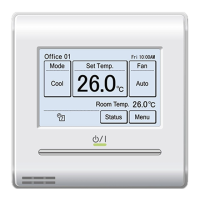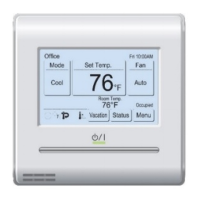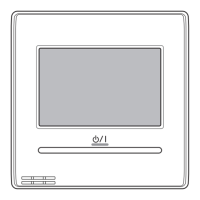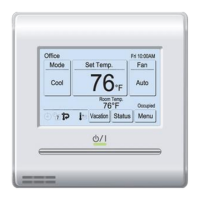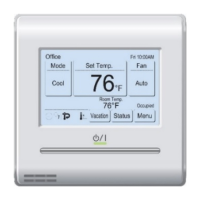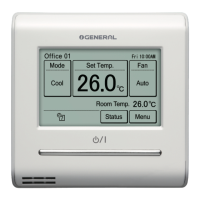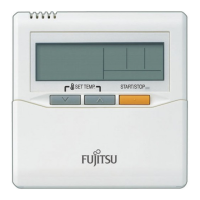Do you have a question about the Fujitsu UTY-RNRYZ5 and is the answer not in the manual?
Important safety information and warnings for proper usage and potential hazards.
Provides definitions and explanations of system-related terms for VRF and other air conditioning systems.
Details on setting and managing administrator and installer passwords for unit access and security.
Identifies and describes the components of the remote controller, including the touch screen and buttons.
Explains the main screen of the monitor mode, detailing its display elements and icons.
Describes how to view and interpret the status screen, including various icons and their meanings.
Instructions on how to activate and deactivate the child safety lock feature to prevent accidental operation.
Explains the emergency stop function and how it is displayed when activated by external operation.
Instructions on how to turn the indoor unit on and off using the remote controller, including indicator lamp status.
Guide to basic operation settings like mode, temperature, and fan speed adjustments.
Navigating the main menu to access various setting screens and options available for configuration.
Explains the comfort setting for air flow direction, affecting room air conditioning distribution.
Details on setting vertical (VT) and horizontal (HZ) air flow directions for optimal comfort.
How to set individual air flow direction for each outlet on compatible cassette type indoor units.
Overview of the timer functions available, including On Timer, Off Timer, and Auto Off Timer.
Steps to set the On Timer to start the indoor unit operation automatically after a specified time.
Instructions for setting the Off Timer to stop the indoor unit operation automatically after a specified time.
How to set the Auto Off Timer, which stops operation after a set time following an On/Off button press.
Guide for setting up weekly operating schedules with up to 8 time slots per day.
How to select or disable the weekly timer schedule, enabling or temporarily pausing its operation.
Detailed steps for creating daily operating schedules for up to two patterns and eight time slots.
Setting specific days of the week to temporarily disable the Weekly Timer function.
Introduction to various special settings like Economy, Auto Return, and Anti Freeze for optimized operation.
Configuration of the Economy mode to offset temperature settings and suppress power consumption.
Setting a timer for the temperature to automatically return to the preset value after manual adjustment.
Restricting the temperature setting range to suppress power consumption based on operating modes.
Enabling Anti Freeze function to prevent freezing of water lines during low outdoor temperatures when unit is off.
Configuring the Human Sensor for energy-saving operations like Auto Saving or Auto Off based on room occupancy.
Setting the fan to operate intermittently during cooling for energy savings once the temperature is reached.
Adjusting the time display and timer operations for Daylight Saving Time, shifting by one hour.
Accessing preference settings for the touch screen, including calibration, backlight, and contrast.
Calibrating the touch panel screen by touching specified marks for accurate input response.
Configuring backlight behavior, including enable/disable, brightness level, and automatic turn-off time.
Adjusting the contrast of the display screen for better readability.
Performing initial setup and configuration tasks required at installation or for changing basic settings.
Changing the display language of the remote controller to various supported languages.
Setting the current date, time, and display formats for accurate timekeeping and logging.
Selecting the temperature unit for display, either Celsius (°C) or Fahrenheit (°F).
Setting or changing the name for the remote controller group to identify connected indoor units.
Configuring the remote controller's sensor usage for sensing room temperature at a preferred location.
Managing passwords, including changing the administrator password and setting password requests for specific functions.
Controlling the visibility of display items like Filter Sign and Room Temperature on the screen.
Setting up the Lead Lag operation to manage indoor unit stop cycles for fixed room temperature control.
Verifying and clearing the error history logs, providing details on past system errors and their codes.
Viewing a list of all current settings for verification and troubleshooting purposes.
Resetting the filter sign indicator after cleaning the indoor unit's filter.
Checking the software version of the remote controller unit.
Monitoring sensor values from selected indoor or outdoor units for diagnostic purposes.
Lists selectable operating modes based on system configuration, unit status, and system type.
Displays a confirmation message for approximately 3 seconds after a setting change is completed.
Details the adjustable temperature ranges for different operation modes and system types.
Provides the physical dimensions of the remote controller unit in millimeters and inches.
Lists the technical specifications of the remote controller, including model, power, display, and operating conditions.
Lists common error codes and their corresponding contents for troubleshooting system issues.
| Power Supply | 2 x AAA Batteries |
|---|---|
| Operating Temperature | 0°C to 50°C |
| Display | LCD |
| Type | Remote Control |
| Compatibility | Fujitsu Air Conditioning Systems |
| Features | Timer |
| Power Source | Battery |
| Functions | Mode |
